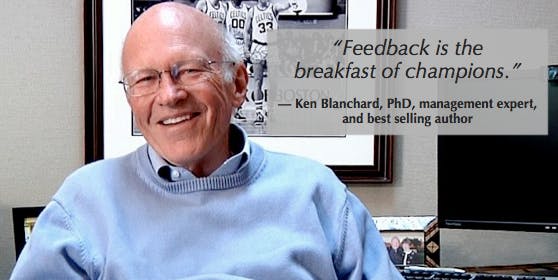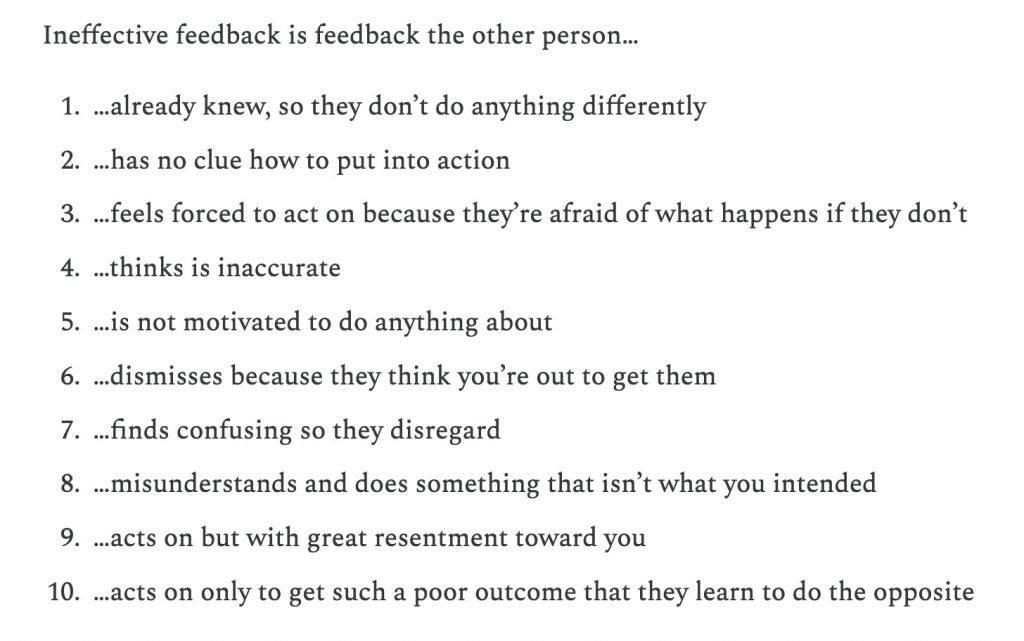"I wish I'd done this weeks ago..."
That's what went through my mind as I reviewed applicants for a Virtual Assistant role I just opened on Upwork.
It turns out, many of the VAs not only have the skills to do the work I know has been backing up and taking up too much of my time, but they also have experience doing things that I really should be offloading to them I hadn't thought to delegate.
That's how it often goes with good ideas; you don't know every way something can help you, but once you get going your only thought becomes "I wish I'd done this sooner!"
In today's edition, we talk about the emotions of giving feedback, the sorry state of Performance Management Systems, answer a reader question about managing across generations, and a brand new post for you to help you when you're hiring managers at your company.
We also have a new, important survey, which we'd love your input on. Best of all *two* lucky participants will win a leadership book of their choosing, so please take a minute to complete it here.
Let’s dive in…
Table of contents:
- 🥘 Food for Thought on Your Emotions When Giving Feedback
- 📰 News & Reports for Managers on The State of Performance Management
- 🗣️ Ask Lighthouse on Building Trust Across Generations
Note: This is a preview of our weekly leadership newsletter, Lighthouse Leadership Weekly (LLW).To get this sent to your inbox every week, along with our latest long form essays on this blog, you can sign up here.
➡️ Did a friend forward this to you? Get every issue straight to your inbox by signing up here.
🥘 Food for Thought
"The litmus test for great feedback is actually really simple. Did your feedback result in the other person taking action in a way you and they feel good about?
If yes, pat yourself on the back. Your feedback was great, and you gave them a valuable gift.
If not, then it wasn’t." - Julie Zhuo, former VP of Design at Facebook
This is from a tweet related to a longer form essay by Julie, which you can read here.
While I love more people talking about giving feedback, I think this advice misses the mark, and today, I'd like to explore why:
Feedback should not be about emotions.
This is the biggest issue I have here. The messaging is off to say "...you and they feel good about"
Let's be honest. Feedback is often uncomfortable and difficult.
It's not always pleasant to deliver, and it can be a tough pill or bitter medicine to swallow on the receiving end.
There's a reason I've heard more than one executive remark that they pour a stiff drink when they go over 360 feedback they receive.

That's why your mindset when giving feedback should be unemotional:
- For you, if you're upset, the feedback will end up feeling confrontational or potentially too soft.
- For them, it's going to be personal, and there's no way they won't be left feeling any of a range of emotions about it, especially if their job is now on the line because of it.
Feedback is about actions (or inaction) that need to change.
One of the big ways that giving or receiving feedback can go sideways is when you make it personal.
There is a very big difference between, "some of your support tickets lately have been curt and unfriendly" and "you are curt and unfriendly."
The former calls out an issue, but makes the focus on the tickets, while the latter is a personal attack on their identity. The latter makes it seem like it's a personality flaw, as opposed to a skill to work on.
The more you can bring matter-of-fact-ness to your feedback, the easier it is to give and receive.
- When you follow our Prepare-Listen-Act process, you'll be able to present a series of facts and examples of an issue around a theme that needs to change.
- When you deliver it in a relatively neutral to somewhat serious tone (instead of anger, frustration, or in an accusatory way) it's easier for the person to accept it; it won't feel like an attack, but instead someone trying to help you.
- Sticking to the facts and impact of the area of feedback helps them better understand what to change and why. It's a fork in the road that goes for action over emotion.

The only metric that matters: Did they change?
As Ken Blanchard reminds us, feedback is a critical part of building winning teams. You can't expect perfection at all times, but you can build towards excellence over time by giving good coaching and feedback.
Fortunately, Julie and I agree on a lot on the fundamentals of good vs. bad feedback. I like her list of ways feedback fails:

I also love her sentiment on raising the bar:

But the one message I want to reiterate is that "feeling good" doesn't really apply to feedback.
Yes, there are methods like the Feed Forward which can be positive and energizing, but in the end our goals as leaders is to bring out the best in our teams. Sometimes that involves difficult conversations that have to happen.
And at times neither of you will enjoy the discussion, but it has to happen.

Uncomfortable, but necessary: A story
Tying this all together, a quick story: a friend (we'll call him Joe) was a great engineer. Unfortunately, he was going through an ugly divorce, and his work had really taken a hit.
He wasn't reviewing as many PRs anymore, and his comments were sparse. His work was also slowing. He went from a pace-setter to the middle of the pack on the team.
His manager had noticed, but tried to give him some space.
Unfortunately, the time for that had run on for a bit too long.
So Joe's manager finally had a sit down with him to talk about it.
Joe's manager was a long time work friend, and so in some ways it was easier, because they had plenty of rapport. In other ways though, it was hard to have tell a friend, "your work has slipped quite a bit."
Fortunately, this story has a happy ending, because of how they both approached the feedback:
- Neither person was looking forward to the discussion, yet they had it anyways
- It was uncomfortable to have to call out these issues, especially knowing what Joe was going through personally
- Yet, because of their pre-existing relationship, they were able to put emotions aside and have a real conversation about it.
It was through this conversation that they came up with a solution that made all the difference:
- Joe took a week's vacation. This let him recharge and deal with things in his personal life that were causing him to rush at times at work.
- Joe's manager made some accommodations. Knowing how Joe's schedule was more complicated now, it allowed them to work out a work schedule that allowed Joe to be fully present at home and at work.
- Joe dug in, refocused, and raised his performance. It wasn't always easy, but Joe made major efforts to do his best work when he was at work. He knew he owed his manager for how we was trying to support him.
None of this was easy, and it required some uncomfortable conversations to get there, but Joe stayed at the company another 2 years after this played out, and returned to his old form.
Yet, this wouldn't have happened if they had focused on emotions. This had to be just the facts and a frank, honest conversation.
Feedback isn't easy, but leaving emotions at the door can make a big difference.
--
What questions do you have about giving feedback? Reply and we can explore more nuance of this in a future Ask Lighthouse.
📰 News & Reports for Managers
📌 Just 2% of CHRO's are happy with their Performance Management systems
Having tried to build a company in this market, this report from Gallup made me crack up a bit:
"2% of CHROs from Fortune 500 companies Gallup recently surveyed strongly agree that their performance management system inspires their employees to improve.
Employees tend to share this perspective -- only one in five report that their performance reviews are transparent, are fair or inspire better performance."
Unfortunately, the say vs. do gap in this industry is enormous.
What gets bought and the overall buying process is why this is the case. (Hint: It's the incentives!)
Businesses in the industry are incentivized to go for breadth of features in a never ending arms race over building fewer, quality, deep features.
I recently spoke to someone who does training in the industry. He told me about the conflict he had when he tried to add a line to his business to help with better performance management system adoption; it turned out that many of the features were never designed to be used. He was causing problems by trying to get people to use them!
Needless to say, he got out of that line of work quickly once he realized this.

Built to sell, not to use.
For many years, Lighthouse tried to convince HR buyers that no one would use most of the features they would ask for in demos. Yet, they consistently bought the product with N+1 features, citing things like:
- "I only get this budget once a year, and don't want to have to go back and ask for more money to buy something that does what this product also does."
- "We're really excited to try [Feature X that demoed really well]." (but then typically never used it)
- "I think our managers will really like [Feature Y]." (but never checked with their managers about it)
I remember a particularly sobering conversation I had at a conference in San Francisco when I and an early employee at another HR Tech startup compared notes on this experience. Their frustration was palpable, and confirmed what I was unsure at the time if it was just us seeing this.
A rock and a hard place.
Part of the problem that these CHROs are lamenting in this Gallup survey also lies at the feet of your average employee.
Another hard earned lesson I learned was that many employees have an immediate revulsion to anything HR mandates.
They immediately fall into doing "only what I'm absolutely required," which makes product adoption difficult, even if a product is great. It was a mind-blowing moment for me when I saw the *exact* same feature that we had heard many managers say they loved when they signed up on their own was now a point of complaint when HR mandated their usage.
It's hard to inspire employees to improve if the employees refuse to use the product.
The Bottom Line: It's the incentives!
The truth is, there are a ton of well meaning people on all sides in this industry. Yet, the incentives are what cause performance management systems to not have the impact they could.
What gets bought and wins in the market is what we get more of.
That's why it's on you as a manager to find your own path to growth and ways to engage and motivate your team.
🗣️ Ask Lighthouse on Managing Across Generations
A reader wrote in with a common and challenging question;
"How can I build trustworthy relationships among my staff? I have a huge age range."
If you manage a team of your peers and people you're friends with outside of work, some things can seem pretty easy; you get along and understand each other because you have a lot of the same interests and you're at roughly the same stage of life.
When that's not the case, and you have multiple generations of people on your team, it presents extra challenges.
Your team can still thrive, but there's some extra effort you should make for the sake of everyone and the potential of your team.
Here's a few tactics that can help you:
1) Focus on what you have in common first
Quick: What does a 55 year old and a 25 year old have in common?
At first, you may think there's nothing, but look a little deeper and there are plenty of things they could share:
- Same hometown or home country
- Attended the same university or college
- Root for the same sports team
- Similar sense of humor
And there's many more ways that anyone can build rapport with anyone else. (Over 100 ideas here.)
The point is to recognize that even across generations, there are ways people can have things in common and you can build rapport.
Start by finding out for yourself things about your team and what you have in common with them. Then, you can surprise your team by pointing out how they may have more in common than they knew, and creating other opportunities for them to find them out on their own (team outings, lunches, happy hours, etc).
2) Identify everyone's strengths and lean into them.
Rapport and relatedness is just one part of building a strong team. A big part of trustworthy, strong relationships is respecting the skills and contributions of each other.
As a leader, you can make a huge difference in the effectiveness and trust across your team by focusing on everyone's strengths.
To do that, you can take a few steps:
- Figure out everyone's strengths: When you take over a new team this is one of the first things you should try to determine. The sooner you know their strengths, the sooner you can get everyone in the right roles and responsibilities.
- Help your team members use their strengths often: There are many studies that show this leads to happier, more engaged employees, and it builds more trust as your team will see how everyone can contribute best.
- Praise people's strengths in front of the team: If your team doesn't know each other well yet, it can help to also praise and recognize people's strengths in group settings so people understand the contributions everyone is making. It's not always clear to everyone if you don't say anything.
By putting everyone's strengths front and center, it becomes clear to everyone how each person is uniquely helping your team win. That's a great way to build trust, and has nothing to do with age, gender, generation, or any other surface level factors.
3) Treat everyone differently, yet fairly.
My last tip may seem a bit unorthodox, but when it comes to trust, it can make a big difference.
The truth is, depending on your stage of life, and the generation you're in, you will have different habits, needs, routines, and goals. That's why you must avoid trying to lead with a one-size-fits all approach; what resonates for a Gen Z, 20-something employee wouldn't work exactly the same for your veteran Boomer staff member.
That's why you want to treat everyone differently, yet fairly.
- Different, meaning recognizing that everyone across generations will have different requests and needs.
- Fairly, meaning that you try to be reasonable to everyone despite their asks potentially being quite different.
Here's a couple examples of "different, yet fair" in action:
- Find out their rhythm. Rhythm is a concept from Marissa Mayer about recognizing the thing that "matters to you so much that when you miss it, you're resentful of your work." That can vary a lot what it is, but you can be fair by trying to not interfere with anyone's most important thing.
- Make reasonable accommodations. There will be times your team members will make requests. Whether it's to leave early for their child's event, or take a half day on a Friday for a trip with friends, you'll build trust and buy in if you have a consistent policy that can fit multiple generations like: "Let me know at least 2 weeks ahead of time, and as long as you get all your work done on time..."
When you trust your team, they'll often trust you more as well. And when you pair some extra freedoms with responsibility and accountability for their work, you may be surprised the performance and loyalty you get from your team.
Managing across generations definitely adds another degree of difficulty to managing a team, but with a little extra thoughtfulness and care, you can build trust and loyalty with a staff of any age or age difference.
Sign up to get this newsletter & our latest blog posts straight to your inbox:




